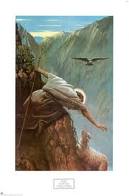Luke 16_19-31 Entertainment
Â
 Things are different today, here in Australia. We are a far more compassionate, educated and a civil society than in Jesus day.  Wouldn’t you agree? The average Aussie is now far more socially aware of the suffering of the poor, of the down trodden and the protection of the rights of the vulnerable, than when Jesus told this parable.  Christianity, with its core values and teachings of love for God and loving service for all, and that all humans are created in the image of God, has greatly influenced the way we now value the sanctity of every human life.Â
Things are different today, here in Australia. We are a far more compassionate, educated and a civil society than in Jesus day.  Wouldn’t you agree? The average Aussie is now far more socially aware of the suffering of the poor, of the down trodden and the protection of the rights of the vulnerable, than when Jesus told this parable.  Christianity, with its core values and teachings of love for God and loving service for all, and that all humans are created in the image of God, has greatly influenced the way we now value the sanctity of every human life.Â
Consider Jesus’ parable of the rich man and Lazarus the beggar. A rich man is so ignorant to the inequality and the right to life for all people, that Lazarus lay dying at his front gate, while he continues to be ‘dressed in purple and fine linen and lived in luxury every day.’  The contrast from that day to this could not be starker…its chalk and cheese; it wouldn’t happen today. So much so, the parable makes little sense to us here in Australia.
Who here regularly sees or reverses out of their driveway past a totally destitute, sore infested, near death beggar, dumped out the front of our house? What rich man today would risk the media and public backlash of being accused of leaving a poor man to die at their front gate? Of course no one in our community, you me, rich or poor, would stand for social inequality…everyone has a right to life; to a fair go! We have the society we do, because our social conscience is built on and around our Christian roots. We get it from what Jesus says of himself in Luke 4:18 “The Spirit of the Lord is on me, because he has anointed me to preach good news to the poor. He has sent me to proclaim freedom for the prisoners and recovery of sight for the blind, to release the oppressed.â€Â He urges us to do like wise, saying ‘A new command I give you: Love one another. As I have loved you, so you must love one another.â€Â Â
It makes us wonder how the rich man got the point where he refuses to give Lazarus even a crumb that fell from his table. It puzzles us as to how a religious Jew, who was a descendant of Abraham, from the tribe of Israel, could come to the point where he is totally indifferent to God, to sin, to heaven, or whether there was a hell. It troubles us as to what convinced this once religious man, to be so consumed with the philosophy common in that day, to ‘Take life easy; eat, drink and be merry“, that Lazarus was not worth his time, money and effort; that the commandment ‘thou shall not kill’, did not apply to Lazarus, as his life was worth less than his own.
As I said earlier, it doesn’t happen in our society, in our day…or does it? Perhaps we also are part of the rich man’s story? What are we indifferent about today? While we are not as barbaric as publically leaving people to die on our doorsteps, and while we are not outwardly flaunting the philosophy ‘Take life easy; eat, drink and be merry.”, as the rich man did, we are, as a society, perhaps even as Christians, dangerously indifferent. Indifferent to God, to faith and right theology, indifferent to whether there really is a heaven or a hell; indifferent to wether Jesus really is the only way, truth and life, and apart from him we can do nothing. And this indifferent attitude towards God has had social consequences that have now crept slowly, like a noxious weed, into our society.
The right to life, and the sanctity of life for all people, especially the vulnerable, is being eroded away by our self interest in enjoying life. We don’t leave a terminally ill man like Lazarus lying on the front path to die, but we are now open to debating the right to euthanize the terminally ill…with their supposed consent of course.  We as a society, like the rich man, are prepared to turn a blind eye to the suffering and loneliness of the sick and elderly, encouraging them to end their life, so we can “eat drink and be merry.â€
We are all guilty of being too busy today, and indifferent ‘dressed in purple and fine linen and living in luxury every day, to spare even a crumb of our time for God and the sick and dying, which might fall from our busy ‘timetables’. We are all infected with the rich man’s terminal disease called ‘indifference.’  Â
Sin is indifference to God, not caring that he is angry and offended by our not loving him with our whole heart, mind and soul, as he commands. Sin is to eat, drink and be merry, while having no regard for the life and welfare of others. Sin is to be indifferent to Jesus call to “go, sell your possessions and give to the poor, and have treasure in heaven. Then come, follow me.” And as the rich man in the parable found out, St Paul’s words ring true for us “the wages of sin is death.â€Â We may be indifferent, not really comprehending the depth and nature of our sin, and the decadence and indifference of our society, but God is not, and in this parable, Jesus warns us of the fires of hell are ready for those who live in this manner.
Like dead men walking, there is nothing in this world we can do to change our fate, as Jesus says in Revelation 20: 15 “If anyone’s name was not found written in the book of life, he was thrown into the lake of fire.â€Â Yet there is good news imbedded in the parable, there is grace to be found. Did you notice from the start, Jesus gives a name to the beggar, Lazarus?Â
The rich man has no name. Even though many of his friends would have known him, God does not know him. His name may have been written in all the social columns of the newspapers, but his name was not written in the book of heaven. He may have been an upright and moral gentleman, but because his name is not known by God, he was thrown into the lake of fire. Â
Lazarus was given a name, though he did nothing, had nothing, and was an outcast and beggar; his name didn’t even get a mention in the death notices…he was not buried, but left for the angels to take him away. Yet because his name is written in the book of life he enters heaven, as Jesus tells, “The time came when the beggar died and the angels carried him to Abraham’s side.â€Â Jesus names him because he is one of his own.  Â
Lazarus may have suffered while still living, and we don’t know what caused it. Perhaps it was his fault, perhaps he had squandered his money like the prodical son, perhaps he was struggling with the results of years of alcoholism, and that’s why the rich man didn’t help, but the stunning fact of God grace in this story, is Lazarus’ name was written in the book of life, and he was taken into heaven.Â
Lazarus’ name was know by God, and the rich man’s wasn’t, not because he was a better bloke, but because Lazarus heard and believed in Jesus, the promised saviour spoken about in ‘Moses and the Prophets’; that Isaiah spoke of “he was pierced for our transgressions, he was crushed for our iniquities; the punishment that brought us peace was upon him, and by his wounds we are healed.â€Â Jesus went to the cross, suffered and died for us, who are hopelessly caught up in the riches and indifference of sin. Isaiah says “He was assigned a grave with the wicked, and with the rich in his deathâ€Â
But God raised him from the grave that he may live forever.  Death could not hold him, and now death and hell has no power, no sting for us who are named in Christ. This is the grace that is announced in the parable; the grace that is now poured out upon us through the preaching of the gospel and the administration of the sacraments. What we hear today, what we eat and drink today, are the very grace giving words of Jesus, who was anointed to preach to the poor and to bring freedom to us who are prisoners to sin. In baptism, we are named as a child of God.Â
God makes us his own, giving us his Spirit and putting our name into the book of life, as St Paul in 2 Corinthians 1:22 says “He anointed us, set his seal of ownership on us, and put his Spirit in our hearts as a deposit, guaranteeing what is to come.â€Â Since we are God’s children, and have our names in heaven, let us now be attuned and attentive to God’s word, and to give more than just crumbs and token efforts to the suffering people of this world. Let us no longer entertain ourselves, but rather hear the words of Hebrews 13:2 “Do not forget to entertain strangers, for by so doing some people have entertained angels without knowing it.â€

